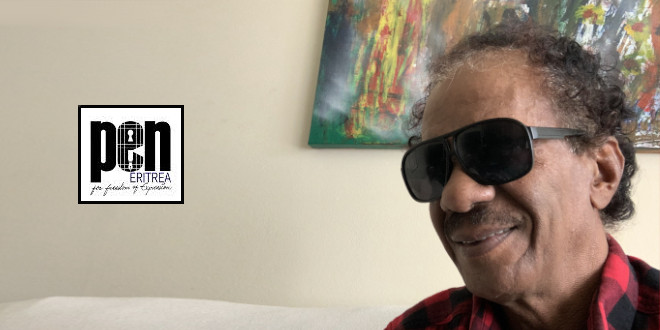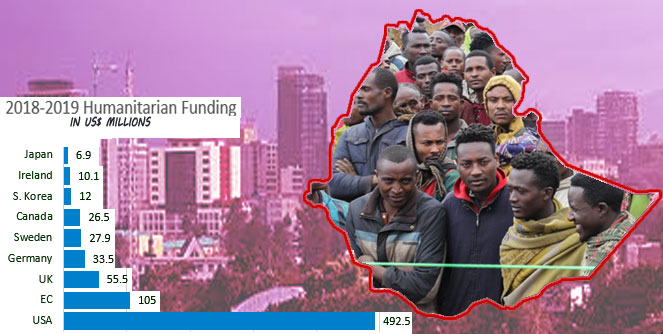Isaias Afwerki & The UN: Will He Or Won’t He?

The 66th session of the United Nations General Assembly is scheduled to convene on Tuesday, September 13. The cheerleading squad of the PFDJ has been building up expectations that Isaias Afwerki, the self-declared president of Eritrea, will attend the session. Will he or won’t he? Is there any significance to his attendance or absence?
For starters, as the head of state, Isaias Afwerki is “entitled” to attend the UN’s General Assembly session. Every ogre, every loudmouth, and every border-line crazy tyrant has been allowed to attend the UN, and to even address the general assembly—by virtue of being the head of state. To the extent he hasn’t attended previous general assembly sessions, it is only because Isaias Afwerki has a tendency, much like a child, to throw a temper tantrum, only to come begging for the same thing he rejected. The case of his renewed membership in IGAD and representation to the African Union are recent examples of these temper tantrums. So any attempt to show a routine travel as a diplomatic coup is an act of ignorance, at best, or congratulating a child for ceasing (temporarily) from his habitual temper tantrum.
Lately, Isaias Afwereki has been trying hard to rehabilitate himself by meeting UN secretary Ban Ki-Moon in Juba; visiting President Museveni of Uganda last month and a letter he wrote to President Obama recently (see an image of the letter below). Our sources in Eritrea indicate that Isaias Afwerki has been trying to get an audience with President Obama and Secretary Clinton when he comes for the UN session. If he secures an audience with US officials, his regime will present it as a diplomatic breakthrough and his foot soldiers will be elated because he will have a chance to visit Washington DC where he would either meet with a select few of them or hold a public meeting. This, despite the fact that Isaias Afwerki would be settling for something he rejected two years ago—a conversation with Secretary Hillary Clinton. But if that doesn’t materialize, and he visits only New York, preparations are underway by the same foot-soldiers to demonstrate their support for the Isaias regime. To make matters worse, it is also very likely that he might cancel the trip altogether. But contrary to what the regime and its supporters think, the UN is less worried about all of that, for reasons stated below:
The agenda of the United Nations does not include anything specific about Eritrea. Unless one counts the following hold-over from the 65th general session as blockbuster news:
In a consensus text on financing of the United Nations Mission in Ethiopia and Eritrea (UNMEE) (document A/65/878), the Assembly, recalling in its resolution 1827 (2008) of 30 July 2008 that the Council had terminated the mandate of the Mission effective 31 July 2008, took note of the status of contributions to UNMEE as of 30 April 2011 of credits totalling $2.5 million, as well as included the item in the provisional agenda of its sixty-sixth session. It also took note of the report of the Secretary-General on the final disposition of UNMEE’s assets and encouraged Member States that are owed credits for the closed peacekeeping mission accounts to apply those credits to any accounts where the Member State concerned has outstanding assessed contributions.
And sure enough, item 154 in the heading of “Organizational, Administrative and Other Matters” of the agenda is: “Financing of the United Nations Mission in Ethiopia and Eritrea (resolution 65/298). This deals with the $2.5 million of credits from UNMEE (the peacekeeping mission that Isaias Afwerki kicked out of Eritrea so he can have no witnesses to his brutish administration of Eritrea.)
The issue of international peace and security does not, even peripherally, address Eritrea. Despite what the PFDJ loyalists may think, this is a big world full of crisis, and what keeps their master awake at night is of little concern to the international community. Consider the agenda items under “Maintenance of peace and international security”:
29. Report of the Security Council (rule 13 (b)).
30. Report of the Peacebuilding Commission (resolutions 60/180 and 65/7).
31. Support by the United Nations system of the efforts of Governments to promote and consolidate new or restored democracies (resolution 64/12).
32. The role of diamonds in fuelling conflict (resolution 65/137).
33. Prevention of armed conflict:
(a) Strengthening the role of mediation in the peaceful settlement of disputes, conflict prevention and resolution (resolution 65/283).
34. Protracted conflicts in the GUAM area and their implications for international peace, security and development (resolution 65/287).
35. The situation in the Middle East (resolutions 65/17 and 65/18).
36. Question of Palestine (resolutions 65/13 to 65/16).
37. The situation in Afghanistan (resolution 65/8).
38. The situation in the occupied territories of Azerbaijan.
39. Question of the Comorian island of Mayotte.
40. Necessity of ending the economic, commercial and financial embargo imposed by the United States of America against Cuba (resolution 65/6).
41. The situation in Central America: progress in fashioning a region of peace, freedom, democracy and development (decision 60/508).
42. Question of Cyprus (resolution 58/316).
43. Armed aggression against the Democratic Republic of the Congo (resolution58/316).
44. Question of the Falkland Islands (Malvinas) (resolution 58/316)
45. The situation of democracy and human rights in Haiti (resolution 58/316)
46. Armed Israeli aggression against the Iraqi nuclear installations and its grave consequences for the established international system concerning the peaceful uses of nuclear energy, the non-proliferation of nuclear weapons and international peace and security (resolution 58/316)
47. Consequences of the Iraqi occupation of and aggression against Kuwait (resolution 58/316).3
48. Assistance in mine action (resolution 64/84).
49. Effects of atomic radiation (resolution 65/96).
50. International cooperation in the peaceful uses of outer space (resolution 65/97).
51. United Nations Relief and Works Agency for Palestine Refugees in the Near East (resolutions 65/98 to 65/101).
52. Report of the Special Committee to Investigate Israeli Practices Affecting the Human Rights of the Palestinian People and Other Arabs of the Occupied Territories (resolutions 65/102 to 65/106).
53. Comprehensive review of the whole question of peacekeeping operations in alltheir aspects.
54. Questions relating to information (resolutions 65/107 A and B).
55. Information from Non-Self-Governing Territories transmitted under Article 73 e of the Charter of the United Nations (resolution 65/108).
56. Economic and other activities which affect the interests of the peoples of the Non-Self-Governing Territories (resolution 65/109).
57. Implementation of the Declaration on the Granting of Independence to Colonial Countries and Peoples by the specialized agencies and the international institutions associated with the United Nations (resolution 65/110).
58. Offers by Member States of study and training facilities for inhabitants of Non-Self-Governing Territories (resolution 65/111).
59. Implementation of the Declaration on the Granting of Independence to Colonial Countries and Peoples (resolutions 65/112 to 65/117 and decision 65/521).
60. Question of the Malagasy islands of Glorieuses, Juan de Nova, Europa and Bassas da India (decision 65/503).
61. Permanent sovereignty of the Palestinian people in the Occupied Palestinian Territory, including East Jerusalem, and of the Arab population in the occupied Syrian Golan over their natural resources (resolution 65/179).
62. Report of the United Nations High Commissioner for Refugees, questions relating to refugees, returnees and displaced persons and humanitarian questions (resolutions 428 (V), 65/193 and 65/194).
In the end, whether Isaias Afwerki attends the UN General Session or doesn’t, it will not be a statement on anything other than whether he is panicked—which is the only time he tries diplomacy—or whether he is his usual obstinate self. The solutions to Eritrea will not come from the UN–no matter how often Isaias Afwerki and his state media gripe and complain about the UN or the US. They will come when the regime of Isaias Afwerki is confronted by the people, who have all the wisdom in the world to address issues of peace and war, development, sovereignty, democracy and justice. Until that time comes, Isaias Afwerki may choose to address an empty assembly–as is often the case when madmen address the UN–or he may choose to stay at home and make his frequent visits to the slave plantations he owns in Eritrea: it is all of no significance to the people.




Awate Forum